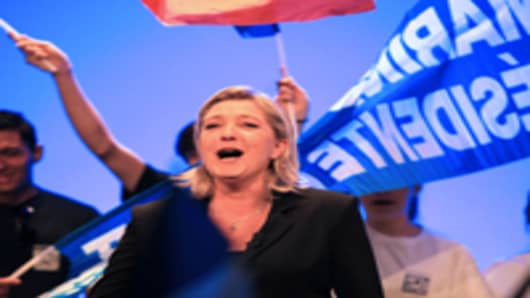As the French presidential race enters its final lap, President Nicolas Sarkozy and his socialist opponent Francois Hollande look set to move on to the second round of the elections. But the country's far-left and far-right candidates may cause an upset.
Marine Le Pen, running for the far-right Front National, and Jean-Luc Melenchon, representing the far-left Front de Gauche, are expected to attract nearly one in three votes in the first round of voting on Sunday.
An Ifop poll showed that as of April 15, Le Pen and Melenchon would receive 15.5 and 14.5 percent of the vote respectively.
Gaetan Dussaussaye, an 18-year old student who plans on giving his very first vote Le Pen, told CNBC.com that France needs an alternative to the “UMPS system,” a blend of Sarkozy's UMPparty and Hollande's PS. “They all go in the same direction,” he said.
On the other side of the spectrum, Thomas Maurice, a 31-year old philosophy student leaving on part-time jobs, expressed the same sentiment.
“I don’t want to choose between right-wing austerity and left-wing austerity,” he told to CNBC.com before mocking Hollande’s program and renaming him “Hollandreou”, a reference to the former Greek socialist Prime Minister George Papandreou, who introduced harsh austerity measures in return for a bailout for the country.
Despite representing two opposite views, both Dussaussaye and Maurice expressed their concern that the people of France had become powerless. The far-right argues they have been forced to cede power to the EU in Brussels, while the far-left says power has shifted to the “world of finance”.
“(A vote for) the socialist party would mean the world of finance had a veto over the people’s sovereignty,” Maurice said.
But while they share the same disillusion over the more traditional parties, the extreme-right and extreme-left in France do not agree on the alternatives.
Economy to Fuel Extreme Views
“Leaving the eurohas become a necessity,” said Dussaussaye who wants to return to the French franc, which would exist alongside a “common”—and not “single”—European currency. “If the currency is devalued and prices go up, salaries and revenues will go up the same way. Plus, if our currency is weaker, we will be able to revive exports, and as a consequence, if demand goes up, we’ll need to produce more and create new jobs ,” he added. Abandoning the single currency has become one of Le Pen’s key targets along with reining in “uncontrolled” immigration.
Unlike the rar-right Front National, the left-wing Front de Gauche does not want to leave the currency union. But Melenchon has nevertheless targeted what he calls the “world of finance” throughout his campaign.
Although economists expect Melenchon’s program to cost up to 150 billion euros ($197.2 billion), Maurice said the benefits would outweigh the costs and believes it will boost the coffers, through higher taxes in particular.
The far-left's party’s aim to raise the minimum wage to 1,700 euros a month, introduce “green planning”—a form of economic planning with a green slant—and rent control which will be funded by a tax of 100 percent on incomes of over 360,000 euros per year. It would also create a French version of the IRS that would hunt down French tax evaders abroad and make them pay taxes at home, Maurice said.
The Front de Gauche also calls banks to be nationalized, and wants to force them to lend money to the government at very low interest rates, potentially a maximum of 1 percent.
Le Pen advocates an overhaul of the corporate tax system. She wants to add the chunk of executives' pay that is over 1 million euros to taxable income , which currently covers total income from normal business activities including rents, interest, and other payments. That would enlarge the pot that is taxed, and leave a smaller pot for dividends for shareholders.
She also wants to levy a 3 percent tax at the European borders in order to fight social dumping of exploited foreign workers as well as environmental dumping.
“Whether it is Sarkozy or Hollande, they’re part of the same system, they have the same program,” Dussaussaye said. In the case of a Sarkozy-Hollande runoff in the second round of the elections, he wouldn’t give his vote to either.
Maurice would not go to the polls either.
“I’m done with the Socialist party,” he said, but added that his friends might be tempted to vote for Hollande anyway in order to defeat Sarkozy on May 6th.



